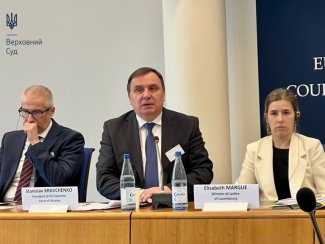Contact center of the Ukrainian Judiciary 044 207-35-46

The European Court of Human Rights and the Supreme Court have implemented a joint project to promote the accessibility of knowledge about the case law of the European Court of Human Rights in Ukraine. Yesterday, 27 February 2025, a conference was held in Strasbourg to launch the unofficial language versions of the ECHR Knowledge Sharing Platform (ECHR-KS) within the framework of the project ‘Strengthening the principle of subsidiarity: supporting knowledge sharing on the ECHR and dialogue between the higher courts’ (Subsidiarity Project).
The high-level event was attended by Alain Berset, Secretary General of the Council of Europe, Gianluca Esposito, Director General of the Directorate of Human Rights and Rule of Law, and Marko Bošnjak, President of the European Court of Human Rights, Stanislav Kravchenko, President of the Supreme Court, Elisabeth Margue, Minister of Justice of Luxembourg, Radu Marinescu, Minister of Justice of Romania, Niyazi Acar, Deputy Minister of Justice of Turkey, Marialena Tsirli, Registrar of the ECHR, and Anna Austin, Jurisconsult to the ECHR.
In his speech, the Supreme Court President stressed that even despite the extremely difficult conditions of war, the Supreme Court made every effort to fulfil its obligations to translate the materials posted on the Platform, as the launch of its Ukrainian-language version is an important step in ensuring the implementation of European standards of justice by the national legal system.
Thus, since 2019, the Supreme Court has been translating and preparing analytical reviews of ECHR judgments, in particular those delivered against Ukraine, publishing relevant materials on its own information resources and sending them to courts of all instances and jurisdictions. Therefore, the launch of the Ukrainian-language version of the Knowledge Sharing Platform is a logical continuation of the Supreme Court's work aimed at disseminating knowledge about the current ECHR case law.
In addition, from now on, having access to the ECHR analytical materials in Ukrainian, judges of national courts will be able to study the ECHR approaches in more depth in order to effectively apply its practice in resolving complex legal issues. In the long run, this will also help to overcome systemic problems that the ECHR has repeatedly stated in its judgments in cases against Ukraine.
In addition, according to Stanislav Kravchenko, the launch of the Ukrainian-language version of the Platform is extremely important not only because of the need for Ukraine to comply with the requirements of the Convention for the Protection of Human Rights and Fundamental Freedoms, but also in the context of the European integration process.
Alain Berset noted that the launch of the Platform's versions in non-official languages is of great importance in view of the principle of subsidiarity, according to which the ECHR plays a supporting role in the protection of human rights, while the main role belongs to national authorities and courts.
The Secretary General of the Council of Europe noted that in the context of studying the ECHR case law, there are two key challenges related to its volume and complexity, as well as its accessibility for those who do not speak the official languages of the Council of Europe. However, these problems have been partially resolved by the launch of the Platform in three additional languages.
According to Alain Berset, the enhanced access to knowledge will expand legal communities, promote better understanding between the ECHR and national courts, and work for future generations.
According to Marko Bošnjak, the launch of unofficial language versions of the Platform is a new step on the path of knowledge sharing, which was launched in 2010 as the Interlaken Process. Subsequently, the Platform ensured the implementation of the idea of subsidiarity and strengthening of the dialogue between national courts and the ECHR, from 2018 - as an internal resource of the Court, from 2019 it was used by the Network of the Presidents of the Supreme Judicial Courts, and in 2022 the Platform became publicly available in English and French.
The materials on the website have now been translated into Romanian, Turkish and Ukrainian. This helps to overcome language barriers to access to the ECHR case law that hinder the principle of subsidiarity.
Marko Bošnjak noted that, given the large volume of ECHR judgments, it is quite difficult to navigate its case law, and the Platform is an effective tool to help in this process.
During the second part of the event, Rasim Babanly, First Deputy Chief of Staff - Head of the Department for Analytical and Legal Work of the Supreme Court, spoke about the process of initial translation of materials posted on the Platform and informed about further plans for their regular updating.

The speaker noted that the Department for Analytical and Legal Work of the Supreme Court has a division for analysing the case law of the ECHR and the Court of Justice of the EU, and it was thanks to the efforts of its employees that the Supreme Court managed to translate the Platform into Ukrainian within a relatively short time.
Rasim Babanly also drew attention to the terminological difficulties that arose in the process, noting that they were resolved with the help of a glossary specially created for this purpose.
For reference. The platform is an extremely useful portal that contains a variety of analytical information on the ECHR case law, including article-by-article and thematic reviews. From now on, all this information is available in Ukrainian.
The launch of the Ukrainian-language version of the Platform was made possible by the joint efforts of the Supreme Court, the European Court of Human Rights and the Department for the Implementation of Human Rights, Justice and Legal Cooperation Standards of the Council of Europe. Further support of the resource in Ukrainian will be provided by the Supreme Court in cooperation with the ECHR.

Link to the Platform - https://is.gd/R0XtWr